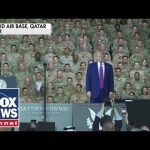President Trump recently wrapped up a state dinner in Qatar, marking a significant moment in U.S.-Middle Eastern relations. The dinner coincided with the FIFA World Cup’s upcoming transition from Qatar to North America, shining a spotlight on not only sports but also diplomacy, investment, and political maneuvering. While the global elite enjoy their fancy dinners, it’s worth examining how these international dealings could trickle down to Middle America and influence everyday citizens.
At the heart of the discussion is Qatar’s substantial financial influence in the United States, which currently stands at a whopping $94 billion. This hefty sum isn’t just pocket change; it includes various sectors like business investments, energy, and even military support through one of the largest U.S. airbases overseas. Additionally, Qatar has poured substantial funds into higher education within the U.S., investing about $6.3 billion, alongside a reported $224 million spent on lobbying and public relations. This influx of cash has fluctuated over the years, highlighting not only Qatar’s influence but also the complexity of international finance and politics.
So why should Americans care about these intricate deals and relationships? The answer lays in the potential benefits these investments bring to the U.S. economy. Each dollar spent can lead to job creation and economic stimulation for American businesses. However, it’s essential to approach this matter with a keen eye. There have been rising concerns about the nature of these investments, particularly regarding Qatar’s alleged support for terrorism and its complicated relationships with other nations in the region.
In contrast to the previous administration, President Trump’s approach to foreign relations is considerably business-centric. Unlike President Biden, who often emphasizes democratic values and human rights, Trump focuses on American interests. This not only involves securing partnerships that benefit the economy but also establishing stability in the Middle East through commerce rather than chaos. A more organized and cooperative approach may foster a climate that is beneficial for both sides.
Looking at the bigger picture, America is not alone in its dealings with Qatar and other Gulf states. Countries like China and Saudi Arabia have made significant financial strides in the U.S., raising questions about how their investments could influence American policymaking. While it’s vital to embrace foreign investments, it is equally important to scrutinize their implications and the motivations behind them. Understanding these complexities helps Americans connect the dots between international influence and domestic repercussions, ultimately empowering them to advocate for policies that prioritize national interests.
As the world changes and alliances are forged or reimagined, the importance of taking a balanced look at foreign investments becomes apparent. Are these partnerships paving the way for a brighter future, or do they hold hidden risks? Keeping a watchful eye on these evolving relationships and their implications can help Americans navigate their own prospects in an increasingly interconnected world. After all, as citizens of a global economy, understanding what these international dynamics mean for their jobs and lives is paramount.




